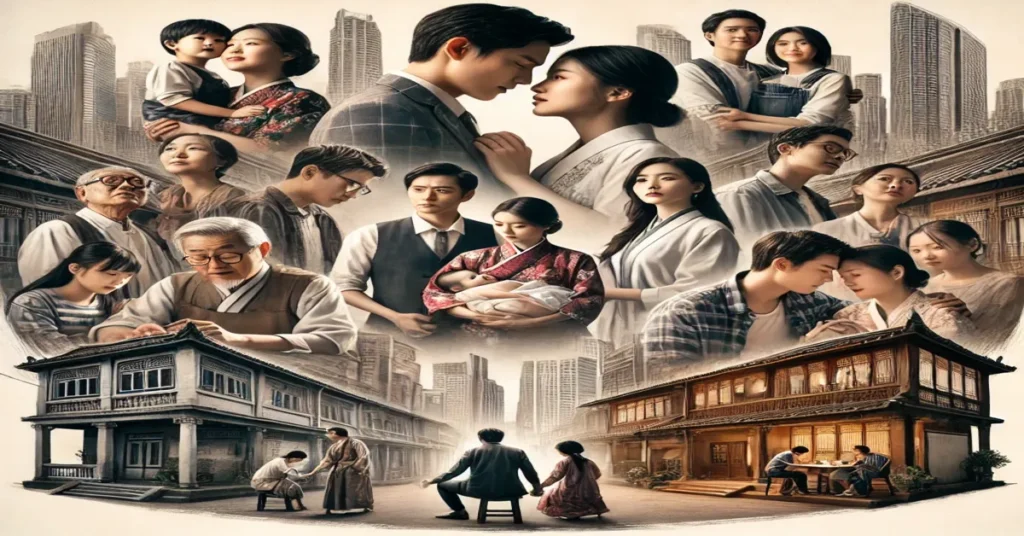Family structures have long been at the center of dramatic storytelling, but in recent years, we’ve seen a growing interest in atypical family dramas (Drama Cool Atypical Family)—stories that break away from the conventional family dynamics to explore more complex, nuanced, and diverse relationships. Platforms like DramaCool, which provide access to a wide range of Asian dramas, have been instrumental in popularizing these narratives around the world.
In this comprehensive guide, we will explore what makes atypical family dramas so compelling, why viewers around the world are drawn to them, and how DramaCool (Drama Cool Atypical Family) plays a crucial role in spreading these stories. We will also look at some of the most popular atypical family dramas available on DramaCool, dissect their core themes, and examine how they challenge traditional family tropes. Finally, we will conclude with frequently asked questions to provide further insights into this fascinating genre.
DramaCool: A Hub for Asian Drama Enthusiasts
What is DramaCool?
DramaCool (Drama Cool Atypical Family) is an online streaming platform that focuses primarily on Asian dramas, including content from South Korea, Japan, China, Thailand, and Taiwan. It offers a wide variety of genres, including romance, historical, thriller, and, notably, family dramas—both traditional and atypical.
The platform has gained immense popularity worldwide due to its accessibility, user-friendly interface, and extensive library of content, which includes both new releases and classic dramas. Importantly, DramaCool is known for providing English subtitles, which make it easier for international viewers to enjoy Asian dramas without the barrier of language.
Why DramaCool is Popular for Family Dramas
DramaCool has become a go-to platform for fans of family dramas for several reasons:
- Diverse Library: DramaCool offers a vast collection of dramas that explore various facets of family life, from heartwarming stories about traditional families to more complex narratives that deal with fractured, unconventional family units.
- Accessible to Global Audiences: The availability of subtitles in English and other languages makes DramaCool a platform that can reach a wide range of audiences, allowing fans from different countries to connect with the content.
- Free Streaming: While many platforms require paid subscriptions, DramaCool offers free access to its extensive library, making it a popular option for those who may not want to subscribe to premium streaming services.
The Appeal of Atypical Family Dramas on DramaCool
Atypical family dramas (Drama Cool Atypical Family) have become increasingly popular on DramaCool, resonating with both Asian and international viewers alike. These dramas offer a fresh take on familial relationships, breaking away from the traditional portrayal of nuclear families to explore more diverse and sometimes fractured relationships. The stories often delve into themes such as stepfamilies, adoption, single-parent households, intergenerational conflicts, and the complexities of non-blood-related family dynamics.
Audiences are drawn to these stories because they offer more than just the typical drama and romance plots—they provide a deeper exploration of what it means to be a family in today’s rapidly changing world.
What is an Atypical Family?
Before diving into the specific dramas, it’s essential to define what we mean by an atypical family. In a traditional sense, families are typically portrayed as consisting of two parents and their biological children, often living together under one roof. However, many modern families don’t fit this mold. Atypical families may include:
- Single-parent families: Where one parent is solely responsible for raising the children.
- Blended families: Where one or both partners bring children from previous relationships into the new family unit.
- Adoptive families: Where parents raise children who are not biologically their own.
- Grandparents raising grandchildren: A family dynamic where grandparents take on the role of primary caregivers.
- Same-sex couples with children: Representing families with two parents of the same gender.
Atypical family dramas on DramaCool (Drama Cool Atypical Family) explore these diverse family structures, highlighting the emotional challenges and triumphs that come with such dynamics.
Themes in Atypical Family Dramas
Atypical family dramas on DramaCool often revolve around complex emotional, social, and familial themes. These themes resonate with viewers, particularly in a world where family dynamics are continuously evolving. Here are some common themes that these dramas tend to explore:
1. Belonging and Identity
A key theme in many atypical family dramas is the search for belonging and identity. Characters in these dramas often struggle with feelings of alienation or uncertainty about where they fit within their family structure. For example, adopted children may wrestle with their sense of identity as they navigate relationships with both their adoptive parents and biological families.
2. Family Loyalty vs. Personal Growth
Many atypical family dramas depict a tug-of-war between family loyalty and personal growth. Characters may feel torn between fulfilling familial obligations and pursuing their dreams or desires. This theme is particularly common in stories where children feel the pressure to conform to their parents’ expectations, even as they strive to assert their independence.
3. The Complexity of Parenthood
Parenthood is central to many atypical family dramas, but it is often portrayed in a more nuanced and complex manner than in traditional family stories. Single parents, step-parents, and adoptive parents face unique challenges as they try to nurture their children while dealing with their own emotional struggles. These stories explore how parenthood can be both rewarding and incredibly difficult, especially when the family structure is non-traditional.
4. Forgiveness and Redemption
Another recurring theme is the concept of forgiveness and redemption. Atypical families, particularly those formed through circumstances like remarriage or adoption, often face conflicts related to past mistakes or emotional wounds. Characters may seek forgiveness from their loved ones, and the journey toward reconciliation is often a key element of the plot.
5. Breaking Stereotypes
Atypical family dramas are also about challenging stereotypes and societal norms. These dramas often feature characters who defy traditional gender roles, expectations about family structure, and social stigmas. By portraying diverse family dynamics, these shows help broaden viewers’ understanding of what it means to be a family in today’s society.
Popular Atypical Family Dramas on DramaCool
DramaCool (Drama Cool Atypical Family) hosts numerous atypical family dramas that showcase a wide range of non-traditional family structures. Here are a few standout examples that have captivated audiences:
1. Sky Castle
Sky Castle is a South Korean drama that delves into the lives of wealthy families who go to extreme lengths to ensure their children’s success. At its core, the show is about the pressures of academic achievement and the sacrifices that parents and children are willing to make to maintain their status in society. However, it also addresses atypical family dynamics, particularly in how the characters navigate relationships with step-parents, estranged family members, and adopted children.
- Themes: Academic pressure, ambition, fractured family dynamics, societal expectations.
- Why It’s Popular: The intense character development and the unraveling of family secrets make it a compelling watch for viewers who enjoy emotionally complex stories.
2. Mother
Mother is a gripping drama that tells the story of a woman who, upon discovering that a child in her care is being abused by her biological mother, decides to abduct the child and become her new “mother.” This drama raises questions about what it means to be a parent and whether biological ties are the only foundation for family. It also highlights the lengths some people will go to protect a child, even if they aren’t related by blood.
- Themes: Adoption, child abuse, unconventional motherhood, protection, identity.
- Why It’s Popular: The strong performances by the cast, along with the heart-wrenching exploration of maternal instincts, make this drama a standout in the atypical family genre.
3. Go Ahead
Go Ahead is a Chinese drama that explores the bond between three non-biological siblings raised by two fathers. The show delves into the unique family dynamic that forms when these unrelated characters come together after facing abandonment by their biological parents. It explores themes of forgiveness, trauma, and how love transcends blood relations.
- Themes: Blended families, abandonment, sibling relationships, parental responsibility.
- Why It’s Popular: Audiences love this drama for its heartwarming portrayal of unconventional sibling relationships and its exploration of fatherhood outside the traditional mold.
4. What Happens to My Family?
This South Korean drama centers on a widowed father and his three grown children, each of whom faces their own challenges in life. The show delves into the dynamics of single-parenthood and how familial bonds can be tested as children grow older and begin to drift away from the family unit. It tackles themes of responsibility, duty, and the complexities of family loyalty.
- Themes: Single parenthood, family loyalty, personal vs. familial obligations, generational conflict.
- Why It’s Popular: The drama strikes a perfect balance between comedy and emotional depth, making it an engaging watch for fans of family-centered narratives.
5. The Penthouse: War in Life
The Penthouse is a gripping drama that focuses on the lives of wealthy families living in an exclusive penthouse apartment. Although the show primarily centers on revenge and competition, it also delves into atypical family dynamics, such as the tension between step-siblings and the pressures placed on children by their parents. The relationships within these families are complex, often fraught with betrayal, jealousy, and power struggles.
- Themes: Wealth, ambition, betrayal, step-families, revenge.
- Why It’s Popular: The drama’s high-stakes plotlines, combined with intense family drama, have made it a huge hit, drawing viewers into its web of secrets and lies.
How Atypical Family Dramas Challenge Traditional Tropes
Atypical family dramas offer a fresh perspective on what it means to be a family. Unlike traditional family dramas, where the focus is often on resolving conflicts and maintaining unity within a nuclear family, atypical family dramas challenge conventional notions of family. Here are a few ways these dramas break the mold:
1. Family is Not Just Blood
One of the most significant ways atypical family dramas challenge traditional tropes is by emphasizing that family is not just about biological relationships. Whether it’s adoption, stepfamilies, or found families, these dramas show that love, care, and support are what truly make a family.
2. Complex Parent-Child Relationships
Traditional family dramas often depict parent-child relationships as either harmonious or in conflict, with the goal of eventual reconciliation. In contrast, atypical family dramas offer a more nuanced portrayal, where parents and children may never fully resolve their differences. These shows explore the emotional complexities of estranged relationships, abandonment, and the impact of neglect or abuse.
3. Gender Roles and Parental Expectations
Atypical family dramas also challenge traditional gender roles and expectations of what it means to be a parent. For example, single fathers or same-sex couples are often portrayed in these dramas as capable and loving parents, breaking away from the traditional “mother as caretaker” stereotype.
4. Exploring Personal Growth Within the Family Context
In many atypical family dramas, the focus is not just on resolving familial conflicts but also on the personal growth of individual family members. These characters are often forced to confront their own flaws and insecurities while dealing with the complexities of their family relationships.
Conclusion
Atypical family dramas have captivated audiences around the world by offering a more complex, realistic portrayal of family life. Platforms like DramaCool have been instrumental in bringing these stories to international viewers, allowing fans from diverse backgrounds to connect with the characters and themes. Whether it’s the exploration of found families, step-parenting, or the emotional complexities of adoption, these dramas challenge traditional notions of family while celebrating the love, loyalty, and resilience that can be found in unconventional relationships.
As the popularity of atypical family dramas continues to grow, we can expect to see more stories that reflect the diversity of modern family structures. These shows offer a mirror to the changing dynamics of family life in the 21st century, proving that family, in all its forms, remains one of the most powerful themes in storytelling.
FAQs
1. What is DramaCool?
DramaCool is an online streaming platform that offers a wide variety of Asian dramas, including content from Korea, Japan, China, and more. It is popular for its free access to dramas with English subtitles, making it accessible to a global audience.
2. What makes atypical family dramas different from traditional family dramas?
Atypical family dramas explore non-traditional family structures, such as single-parent households, stepfamilies, adoptive families, and same-sex couples. These dramas focus on the complexities of these relationships, offering a more nuanced portrayal of family life.
3. What are some popular atypical family dramas on DramaCool?
Some popular atypical family dramas on DramaCool include Sky Castle, Mother, Go Ahead, What Happens to My Family?, and The Penthouse: War in Life.
4. Why are atypical family dramas so popular?
Atypical family dramas resonate with viewers because they reflect the diverse and evolving nature of modern family life. These dramas offer relatable characters and emotionally charged storylines that challenge traditional family tropes.
5. How do atypical family dramas challenge traditional family stereotypes?
Atypical family dramas challenge traditional stereotypes by portraying families that don’t fit the conventional mold. These shows explore themes like adoption, step-parenting, and non-biological families, showing that love and loyalty, not just blood, define what it means to be a family.
6. Are there legal alternatives to DramaCool for watching Asian dramas?
Yes, legal alternatives to DramaCool include platforms like Netflix, Viki, Kocowa, and Hulu, all of which offer a wide selection of licensed Asian dramas with subtitles. These platforms often provide better streaming quality and a more secure viewing experience.







